牛津译林版(2019)必修 第三册Unit 2 Natural disasters Grammar and usage课件(共26张PPT)
文档属性
| 名称 | 牛津译林版(2019)必修 第三册Unit 2 Natural disasters Grammar and usage课件(共26张PPT) | 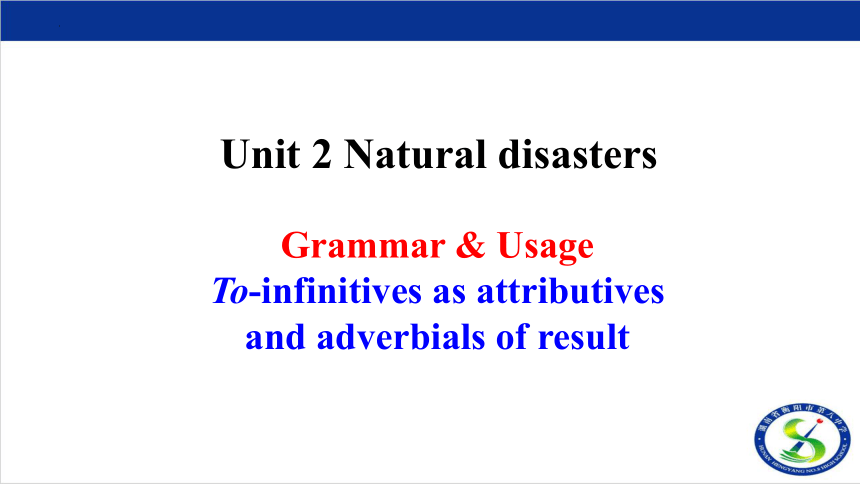 | |
| 格式 | pptx | ||
| 文件大小 | 1.4MB | ||
| 资源类型 | 教案 | ||
| 版本资源 | 牛津译林版(2019) | ||
| 科目 | 英语 | ||
| 更新时间 | 2023-07-14 07:42:21 | ||
图片预览

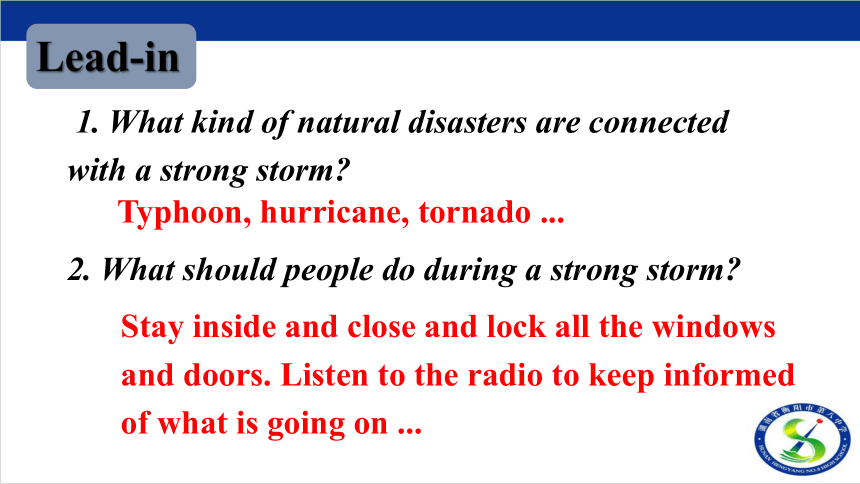
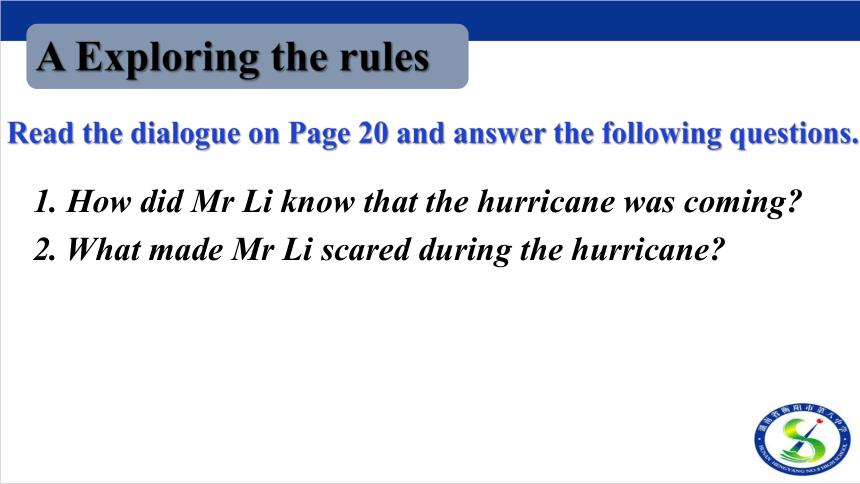
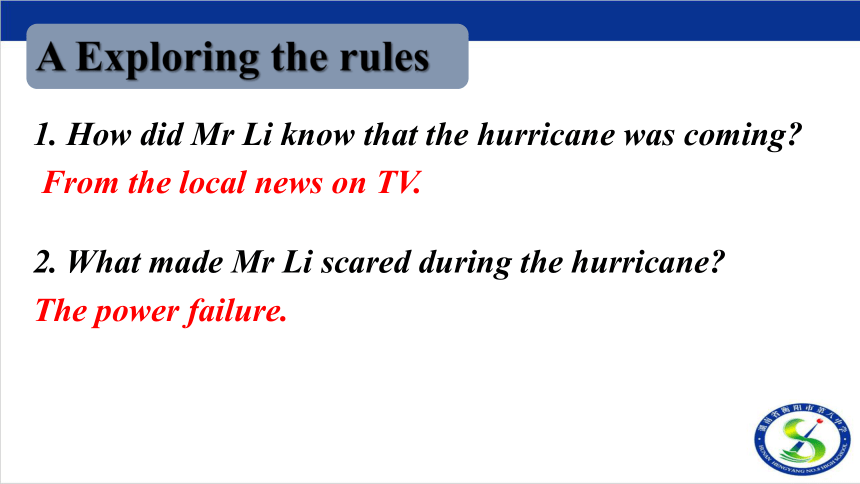
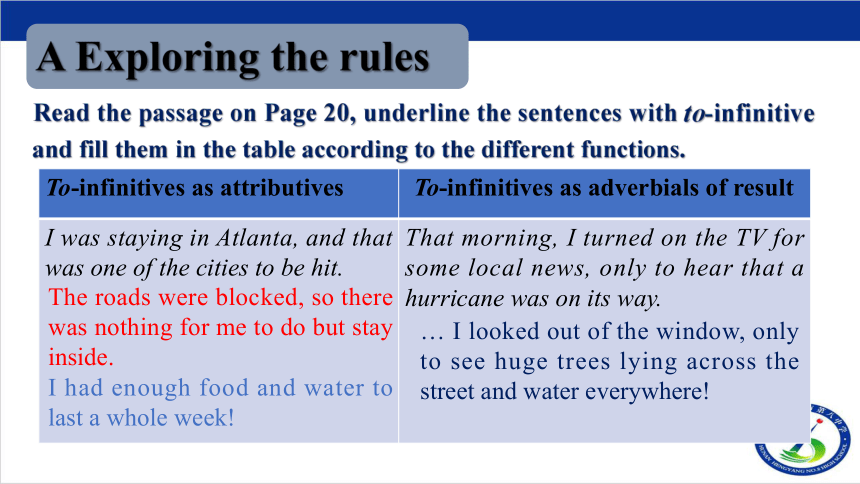
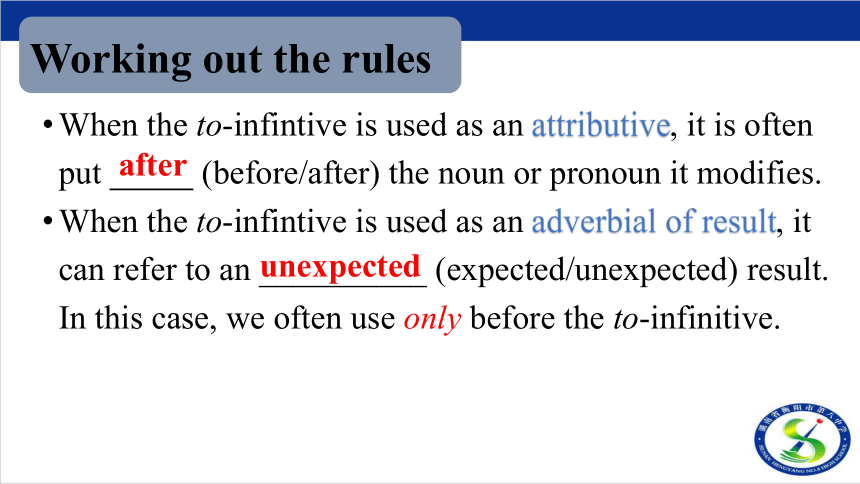


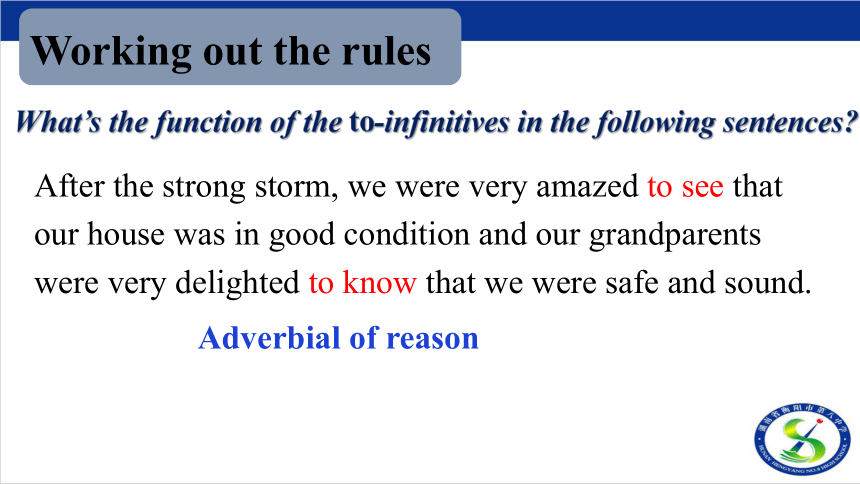
文档简介
(共26张PPT)
Grammar & Usage
To-infinitives as attributives
and adverbials of result
Unit 2 Natural disasters
1. What kind of natural disasters are connected with a strong storm
Typhoon, hurricane, tornado ...
2. What should people do during a strong storm
Stay inside and close and lock all the windows and doors. Listen to the radio to keep informed of what is going on ...
Lead-in
A Exploring the rules
Read the dialogue on Page 20 and answer the following questions.
1. How did Mr Li know that the hurricane was coming
2. What made Mr Li scared during the hurricane
A Exploring the rules
1. How did Mr Li know that the hurricane was coming
From the local news on TV.
2. What made Mr Li scared during the hurricane
The power failure.
Read the passage on Page 20, underline the sentences with to-infinitive and fill them in the table according to the different functions.
To-infinitives as attributives To-infinitives as adverbials of result
I was staying in Atlanta, and that was one of the cities to be hit. That morning, I turned on the TV for some local news, only to hear that a hurricane was on its way.
The roads were blocked, so there was nothing for me to do but stay inside.
I had enough food and water to last a whole week!
… I looked out of the window, only to see huge trees lying across the street and water everywhere!
A Exploring the rules
When the to-infintive is used as an attributive, it is often put (before/after) the noun or pronoun it modifies.
When the to-infintive is used as an adverbial of result, it can refer to an __________ (expected/unexpected) result. In this case, we often use only before the to-infinitive.
after
unexpected
Working out the rules
Go through the notes on page 98 and page 99.
Working out the rules
Working out the rules
What’s the function of the to-infinitives in the following sentences
During a strong storm, we should stay at home and listen to the radio to keep informed of what is going on. Besides a radio, we can have a computer or a smart phone to update the information.
Adverbial of purpose
Working out the rules
After the strong storm, we were very amazed to see that our house was in good condition and our grandparents were very delighted to know that we were safe and sound.
Adverbial of reason
What’s the function of the to-infinitives in the following sentences
Working out the rules
She signalled her students to exit the classroom in an orderly line covering their heads with their hands. And the headmaster asked them to stay outside until the storm was over.
Object complement
What’s the function of the to-infinitives in the following sentences
Working out the rules
1. Alice Brown, head teacher, was teaching when the floor began to shake.
2. It was very dangerous to stay inside during the hurricane.
3. My job today was to keep the student calm outside.
Object
Subject
Predictive
What’s the function of the to-infinitives in the following sentences
Conclusion
What are the functions of to-infinitive
Object
Subject
Predictive
Attributive
Adverbial of result
Adverbial of purpose
Adverbial of reason
Applying the rules
B1
Match the first half of the sentences below with the correct to-infinitives.
1 e 2 c 3 d 4 b 5 a
Applying the rules
B2
Complete the diary entry below using to-infinitives.
(1) to find books about hurricanes
(2) to find he was not in the office
(3) to attend
(4) to make PPT slides for my project
Applying the rules
B3
Work in pairs and complete the conversation using to-infinitives.
(1) was actually the first to leave
(2) to keep us warm
(3) wanted to return home as soon as possible
(4) to find it completely destroyed
(5) advised us to take an active part in the rebuilding
Part C on 64
a. object
b. object
complement
c. attributive
d. adverbial of
purpose
e. adverbial of
result
______ 1 I’m sorry that I cannot come to your birthday party tomorrow as I have an important meeting to attend.
______ 2 She hurried to the cinema, only to find all the tickets
had been sold out.
______ 3 I ask you to complete the task on your own.
______ 4 To reach the summit, we need a local guide.
______ 5 We must learn to walk before we can run.
______ 6 I’m afraid they will have a difficult decision to make.
______ 7 To avoid losing a good friend, you need to apologize
as soon as possible.
______ 8 He left his hometown, never to be heard from again.
______ 9 We agreed to change our plan at the meeting.
______ 10 She invited me to watch a film.
Part C on 64
a. object
b. object
complement
c. attributive
d. adverbial of
purpose
e. adverbial of
result
______1 I’m sorry that I cannot come to your birthday party
tomorrow as i have an important meeting to attend.
______2 She hurried to the cinema, only to find all the tickets
had been sold out.
______ 3 I ask you to complete the task on your own.
______ 4 To reach the summit, we need a local guide.
______ 5 We must learn to walk before we can run.
c
e
b
d
a
Part C on 64
a. object
b. object
complement
c. attributive
d. adverbial of
purpose
e. adverbial of
result
______ 6 I’m afraid they will have a difficult decision
to make.
______ 7 To avoid losing a good friend, you need to apologize
as soon as possible.
______ 8 He left his hometown, never to be heard from again.
______ 9 We agreed to change our plan at the meeting.
______ 10 She invited me to watch a film.
c
d; a
e
a
b
Conclusion
All functions of to-infinitives
1. Subjects
1)To see is to believe.
2) To improve your oral english is your present task.
2. Objects
1) They agreed to hand in improved model tomorrow.
2) The charity hopes to help all the people in need.
Conclusion
3. Attributives
1) We have made environmental policies for business to observe.
2) Ordinary people have a lot of things to cope with everyday.
4. Object complements
1) The government encourages us to protect the environment.
2) Everybody was asked to perfect his or her writing skills.
All functions of to-infinitives
Conclusion
5. Predicatives
1) My job today is to take care of my little sister.
2) Their method seemed to be more practical.
6. Adverbials of purpose
1) Then as a class, out all the parts together to make a booklet.
2) Some people hunt animals for fashion: animal skin is used
to make coats and bags.
All functions of to-infinitives
Conclusion
7. Adverbials of result
1) I ran all the way to school, only to be told that it was Sunday.
2) They tried their best to rescue the missing people, only to find
their dead bodies.
8. Adverbials of reason
1) I was delighted to know the result of the interview.
2) The students were excited to know that they would have two
days off.
All functions of to-infinitives
Consolidation
Translate the following sentences.
1. 少吃点油炸食品是个好主意。
2. 你需要在安静的地方学习。
3. 我告诉他不要放弃。
4. 你能给我一些可以写字的纸吗?
5. 我大声朗读来锻炼我的发音。
6. 我跑到车站,却被告知火车已经离开了。
Consolidation
Translate the following sentences.
1. 少吃点油炸食品是个好主意。
2. 你需要在安静的地方学习。
3. 我告诉他不要放弃。
It is a good idea to eat less fried food.
You need to study at a quiet place.
I told him not to give up.
Consolidation
Translate the following sentences.
4. 你能给我一些可以写字的纸吗?
5. 我大声朗读来锻炼我的发音。
6. 我跑到车站,却被告知火车已经离开了。
Can you give me some paper to write on
I read loudly to practise my pronunciation.
I ran to the station, only to be told that the train had already left.
Homework
Finish extra exercises in regard to “Grammar and usage”
Grammar & Usage
To-infinitives as attributives
and adverbials of result
Unit 2 Natural disasters
1. What kind of natural disasters are connected with a strong storm
Typhoon, hurricane, tornado ...
2. What should people do during a strong storm
Stay inside and close and lock all the windows and doors. Listen to the radio to keep informed of what is going on ...
Lead-in
A Exploring the rules
Read the dialogue on Page 20 and answer the following questions.
1. How did Mr Li know that the hurricane was coming
2. What made Mr Li scared during the hurricane
A Exploring the rules
1. How did Mr Li know that the hurricane was coming
From the local news on TV.
2. What made Mr Li scared during the hurricane
The power failure.
Read the passage on Page 20, underline the sentences with to-infinitive and fill them in the table according to the different functions.
To-infinitives as attributives To-infinitives as adverbials of result
I was staying in Atlanta, and that was one of the cities to be hit. That morning, I turned on the TV for some local news, only to hear that a hurricane was on its way.
The roads were blocked, so there was nothing for me to do but stay inside.
I had enough food and water to last a whole week!
… I looked out of the window, only to see huge trees lying across the street and water everywhere!
A Exploring the rules
When the to-infintive is used as an attributive, it is often put (before/after) the noun or pronoun it modifies.
When the to-infintive is used as an adverbial of result, it can refer to an __________ (expected/unexpected) result. In this case, we often use only before the to-infinitive.
after
unexpected
Working out the rules
Go through the notes on page 98 and page 99.
Working out the rules
Working out the rules
What’s the function of the to-infinitives in the following sentences
During a strong storm, we should stay at home and listen to the radio to keep informed of what is going on. Besides a radio, we can have a computer or a smart phone to update the information.
Adverbial of purpose
Working out the rules
After the strong storm, we were very amazed to see that our house was in good condition and our grandparents were very delighted to know that we were safe and sound.
Adverbial of reason
What’s the function of the to-infinitives in the following sentences
Working out the rules
She signalled her students to exit the classroom in an orderly line covering their heads with their hands. And the headmaster asked them to stay outside until the storm was over.
Object complement
What’s the function of the to-infinitives in the following sentences
Working out the rules
1. Alice Brown, head teacher, was teaching when the floor began to shake.
2. It was very dangerous to stay inside during the hurricane.
3. My job today was to keep the student calm outside.
Object
Subject
Predictive
What’s the function of the to-infinitives in the following sentences
Conclusion
What are the functions of to-infinitive
Object
Subject
Predictive
Attributive
Adverbial of result
Adverbial of purpose
Adverbial of reason
Applying the rules
B1
Match the first half of the sentences below with the correct to-infinitives.
1 e 2 c 3 d 4 b 5 a
Applying the rules
B2
Complete the diary entry below using to-infinitives.
(1) to find books about hurricanes
(2) to find he was not in the office
(3) to attend
(4) to make PPT slides for my project
Applying the rules
B3
Work in pairs and complete the conversation using to-infinitives.
(1) was actually the first to leave
(2) to keep us warm
(3) wanted to return home as soon as possible
(4) to find it completely destroyed
(5) advised us to take an active part in the rebuilding
Part C on 64
a. object
b. object
complement
c. attributive
d. adverbial of
purpose
e. adverbial of
result
______ 1 I’m sorry that I cannot come to your birthday party tomorrow as I have an important meeting to attend.
______ 2 She hurried to the cinema, only to find all the tickets
had been sold out.
______ 3 I ask you to complete the task on your own.
______ 4 To reach the summit, we need a local guide.
______ 5 We must learn to walk before we can run.
______ 6 I’m afraid they will have a difficult decision to make.
______ 7 To avoid losing a good friend, you need to apologize
as soon as possible.
______ 8 He left his hometown, never to be heard from again.
______ 9 We agreed to change our plan at the meeting.
______ 10 She invited me to watch a film.
Part C on 64
a. object
b. object
complement
c. attributive
d. adverbial of
purpose
e. adverbial of
result
______1 I’m sorry that I cannot come to your birthday party
tomorrow as i have an important meeting to attend.
______2 She hurried to the cinema, only to find all the tickets
had been sold out.
______ 3 I ask you to complete the task on your own.
______ 4 To reach the summit, we need a local guide.
______ 5 We must learn to walk before we can run.
c
e
b
d
a
Part C on 64
a. object
b. object
complement
c. attributive
d. adverbial of
purpose
e. adverbial of
result
______ 6 I’m afraid they will have a difficult decision
to make.
______ 7 To avoid losing a good friend, you need to apologize
as soon as possible.
______ 8 He left his hometown, never to be heard from again.
______ 9 We agreed to change our plan at the meeting.
______ 10 She invited me to watch a film.
c
d; a
e
a
b
Conclusion
All functions of to-infinitives
1. Subjects
1)To see is to believe.
2) To improve your oral english is your present task.
2. Objects
1) They agreed to hand in improved model tomorrow.
2) The charity hopes to help all the people in need.
Conclusion
3. Attributives
1) We have made environmental policies for business to observe.
2) Ordinary people have a lot of things to cope with everyday.
4. Object complements
1) The government encourages us to protect the environment.
2) Everybody was asked to perfect his or her writing skills.
All functions of to-infinitives
Conclusion
5. Predicatives
1) My job today is to take care of my little sister.
2) Their method seemed to be more practical.
6. Adverbials of purpose
1) Then as a class, out all the parts together to make a booklet.
2) Some people hunt animals for fashion: animal skin is used
to make coats and bags.
All functions of to-infinitives
Conclusion
7. Adverbials of result
1) I ran all the way to school, only to be told that it was Sunday.
2) They tried their best to rescue the missing people, only to find
their dead bodies.
8. Adverbials of reason
1) I was delighted to know the result of the interview.
2) The students were excited to know that they would have two
days off.
All functions of to-infinitives
Consolidation
Translate the following sentences.
1. 少吃点油炸食品是个好主意。
2. 你需要在安静的地方学习。
3. 我告诉他不要放弃。
4. 你能给我一些可以写字的纸吗?
5. 我大声朗读来锻炼我的发音。
6. 我跑到车站,却被告知火车已经离开了。
Consolidation
Translate the following sentences.
1. 少吃点油炸食品是个好主意。
2. 你需要在安静的地方学习。
3. 我告诉他不要放弃。
It is a good idea to eat less fried food.
You need to study at a quiet place.
I told him not to give up.
Consolidation
Translate the following sentences.
4. 你能给我一些可以写字的纸吗?
5. 我大声朗读来锻炼我的发音。
6. 我跑到车站,却被告知火车已经离开了。
Can you give me some paper to write on
I read loudly to practise my pronunciation.
I ran to the station, only to be told that the train had already left.
Homework
Finish extra exercises in regard to “Grammar and usage”
同课章节目录
- Unit 1 Nature in the balance
- Welcome to the unit
- Reading
- Grammar and usage
- Integrated skills
- Extended reading
- Project
- Unit 2 Natural disasters
- Welcome to the unit
- Reading
- Grammar and usage
- Integrated skills
- Extended reading
- Project
- Unit 3 The world online
- Welcome to the unit
- Reading
- Grammar and usage
- Integrated skills
- Extended reading
- Project
- Unit 4 Scientists who changed the world
- Welcome to the unit
- Reading
- Grammar and usage
- Integrated skills
- Extended reading
- Project
